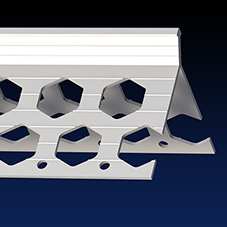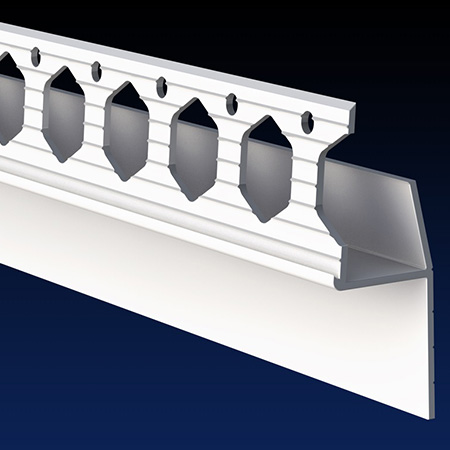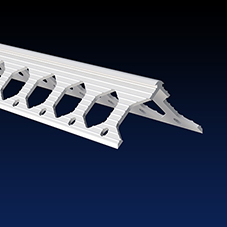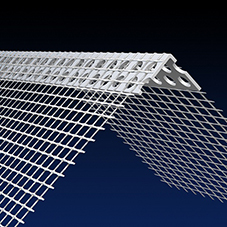In a recent independent environmental profile report Renderplas PVCu beads achieved the top eco-rating available to beading products on the UK construction market. In the report, carried out by Mtech Consult using Life Cycle Assessment (LCA) guidelines published by the BRE, Renderplas products, for rendering, plastering and drylining applications, received an “excellent” Ecopoint rating of just 0.004 per kg installed.
The report concluded that the Ecopoint score is largely achieved because 98% of the PVCu used to make Renderplas beads comes from recycled material.
The environmental impact of using a typical PVC extrusion with no recycled material, compared to a Renderplas Bead is six times worse, based on Ecopoint score simulations carried out in the study. And the gap in the Ecopoint values, compared with galvanised or stainless steel beads, would be even greater again given a number of factors, including the energy required to recycle steel which demands heats of between 1200ºC and 1900ºC to be reached, the process of galvanization or secondary process to turn it into stainless steel, and the high energy required to cold work the steel into strips; and all of that has to happen before the products are actually manufactured.
According to Managing Director of Renderplas, Daniel Leedham-Green, the results prove the environmental case for PVCu beads over steel. “This endorses what we’ve always claimed,” he says, “that our products offer the best environmental credentials in their market.” And when it comes to sustainability he says that it is important for the industry to recognise the difference between a Renderplas bead and PVCu beads in general. “We keep our use of virgin material to an absolute minimum. Our White trade range, for example, is entirely constructed from recycled PVCu. Right across the board our products are made from 98% recycled material, all offcuts are recycled, and all of the PVCu we use is recyclable when buildings are deconstructed. With such impressive green credentials, Renderplas can make a significant contribution to the environmental performance of finished walls, without compromising their construction. Indeed, our ultra strong, ultra light Powerbead is proven to outperform stainless steel in every way.”
There are 12 environmental categories studied by the LCA that affect the entire lifecycle of a product, from creation of the raw materials to the actual forming of the finished product.
By assessing categories such as: effect on climate change, human toxicity, acid deposition and fossil fuel extraction and depletion, the BRE has created an internationally recognised system of scoring products that can be easily understood and is used in the publishing of The Green Guide. The results, called Ecopoints, are expressed per kilogram of finished product. They provide straightforward guidance to anyone involved in any building project on how to make the best environmental choices when selecting construction materials.
Daniel Leedham-Green says meeting green obligations and getting to grips with terms such as embodied energy and environmental impacts can be confusing for the industry. He welcomes the Ecopoint system and its provision of a consistent and common sense approach to measuring a product’s sustainability. He explains, “The Ecopoint system gives us a true means by which products can be measured against each other and the industry recognises this, as can be seen from the number of architects, specifiers and project managers already referring to them”. He goes on to say, “The measurement goes further than just the making of the products too, the initial calculation is further qualified by whether a product is ex-works, fitted and finished, or delivered to site - the latter in our case – and therefore goes further than anything before in delivering real life scenarios to a product’s environmental impact”.
Although the BRE’s Green Guide to Specification (Fourth Edition) does not directly cover render or rendering accessories, such as beading, on exterior and interior walls, MTech Consult’s report concludes that given their excellent environmental profile, Renderplas products could reach an A or A+ rating in a comparative scale that would include the results of its competitors. The rating scale consists of six equal bands, A+ to E and its boundaries are set by the best and worst performing products in a group of comparable alternatives. “Renderplas PVCu beads are an exceptionally green solution, therefore, and as such enable specifiers to take the sustainability and performance of the external envelope to an even higher level,” says Daniel Leedham-Green.
Summing up, Daniel Leedham-Green says that he is delighted with the results of the LCA as it substantiates the Renderplas eco strategy and inspires its commitment to continuing to find new ways to reduce environmental impact. He concludes, “This has been a very valuable exercise for Renderplas; it has independently verified that the Renderplas beads installed in the built environment contain 98% recycled material. It has also shown us how we might be able to raise our environmental image even further, for example, by exploring renewable energy sources and the use of biofuels by our own transport solutions. Most importantly it signals the need for the industry to differentiate between virgin and recycled materials in construction and lifts the stigma on PVCu, highlighting recycled PVCu as a genuine option.”
Celebrating its 21st anniversary in 2011, Renderplas was the UK’s first manufacturer of PVCu beads for the rendering, plastering and dry lining industry, and over the past two decades has led the market with innovations and developments. Renderplas gives a comprehensive choice of 12 colours across a range of different profiles, including ‘wide wing’ solutions and the pioneering PowerBead, the first PVCu bead that truly outperforms stainless steel to ensure ultra strong, straight edges, and which can be fixed directly to the substrate to save time and money. Renderplas PVCu beads can also be used internally for wet plastering, and there are a further five profiles specifically for skim plastering.
View Plaster beads Product Entry View Renderplas PowerBead and Colour Brochure PDF






